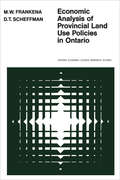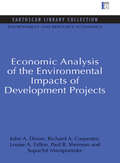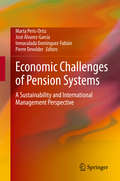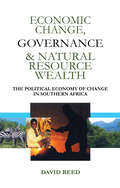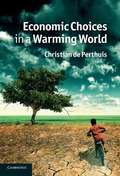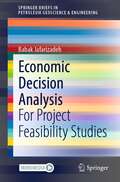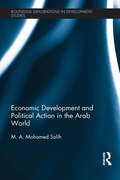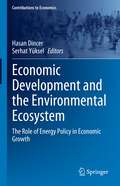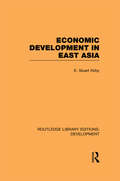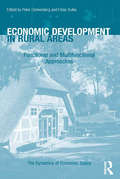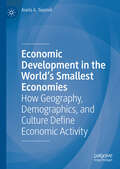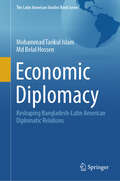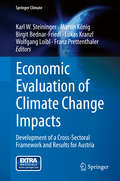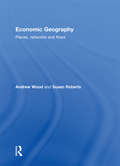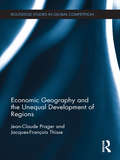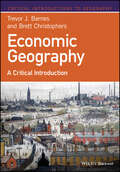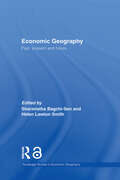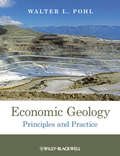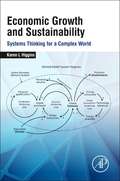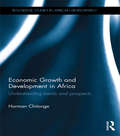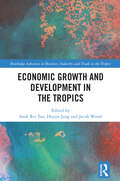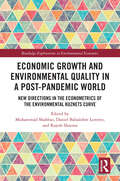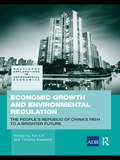- Table View
- List View
Economic Analysis of Environmental Policy
by Ross MckitrickThe relationship between economic growth and the environment is at the forefront of public attention and poses serious challenges for policymakers around the world. Economic Analysis of Environmental Policy, a textbook for advanced undergraduate and graduate courses, provides a rigorous and thorough explanation of modern environmental economics, applying this exposition to contemporary issues and policy analysis.Opening with a discussion of contemporary pollution problems, institutional players and the main policy instruments at our disposal, Ross McKitrick develops core theories of environmental valuation and optimal control of pollution. Chapters that follow cover issues like tradable permits, regulatory standards, emission taxes, and polluter liability as well as advanced topics like trade and the environment, sustainability, risk, inequality, and self-monitoring. Throughout, McKitrick uses clear, intuitive, and coherent analytical tools, so that students, academics, and practitioners can develop their policy analysis skills while comprehending the debates and challenges at the frontier of this exciting and rapidly-developing field.
Economic Analysis of Provincial Land Use Policies in Ontario
by Mark W. Frankena David T. ScheffmanThis book describes and analyses the provincial government's role in municipal and regional planning. The conversion of farmland to urban and other uses is discussed, as are the issues raised by the reports of the Ontario Planning Act Review Committee and the Federal/Provincial Task Force on the Supply and Price of Serviced Residential Land and the province's Green Paper on Planning for Agriculture. The authors criticize the government's failure to conduct cost-benefit studies before setting up planning programs and show that there is little factual basis for recent alarm over the disappearance of farmland. Data gathered here for the first time show that the conversion of agricultural land to built-up urban use and non-farm rural residential use in Ontario has been taking place quite slowly in view of the rate of productivity increase in agriculture, the stock of agricultural land, and the decline in the acreage of census farms. Economists will find in this book a useful survey of recent trends and policies. Planners, policy-makers, and students will welcome this detailed case study of how economic analysis ought to be used in formulating land use policies.
Economic Analysis of the Environmental Impacts of Development Projects (Environmental and Resource Economics Set)
by John A. Dixon Richard A. Carpenter Louise A. Fallon Paul B. Sherman Supachit ManipomokeIt has always been thought that some level of pollution and waste is unavoidable in development projects. But no one has made much effort to quantify and assess the extent of this sort of damage. In this book a group of analysts from the Asian Development Bank and from the East West Center propose a means of constructing useful economic evaluations of the impacts of development projects on the environments in which they are constructed. This study demands the systematic evaluation of all the intentional and unintentional consequences of development initiatives before they are determined upon. It is essential reading for development economists, analysts and bankers. Originally published in 1986
Economic Challenges of Pension Systems: A Sustainability and International Management Perspective
by Pierre Devolder Marta Peris-Ortiz José Álvarez-García Inmaculada Domínguez-FabiánThis book examines the major economic challenges associated with the sustainability of public pensions, specifically demographic change, labor-market relations, and risk sharing. The issue of public pensions occupies the political and economic agendas of many major governments in the world. International organizations such as the World Bank and the OECD warn that the economic changes driven by an aging society negatively affects the sustainability of pension systems. This book analyzes different global public pension systems to offer policies, methods and tools for sustainable public pensions. Real case studies from France, Sweden, Latin America, Algeria, USA and Mexico are featured.
Economic Change Governance and Natural Resource Wealth: The Political Economy of Change in Southern Africa
by David ReedThis volume analyzes the ways in which natural resource wealth has shaped authoritarian political regimes and statist economic systems in the countries of southern Africa in the post-colonial period. It consists of five essays. The first sets out the historical framework and emergence of natural resources as the crucial driver of economies in sub-Saharan Africa. Three essays, drawing on in-country research, focus on Tanzania, Zambia and Zimbabwe. They show how this explains the economic evolution of those countries - in particular, the impacts of economic and institutional changes on the bulk of the population, the rural poor. The final essay explores the nature of the changes and their neoliberal economic context, and the ways in which their harmful consequences might be relieved.
Economic Choices in a Warming World
by Michael Westlake Christian De PerthuisSince the publication of the Stern Review, economists have started to ask more normative questions about climate change. Should we act now or tomorrow? What is the best theoretical carbon price to reach long-term abatement targets? How do we discount the long-term costs and benefits of climate change? This provocative book argues that these are the wrong sorts of questions to ask because they don't take into account the policies that have already been implemented. Instead, it urges us to concentrate on existing policies and tools by showing how the development of carbon markets could dramatically reduce world greenhouse gas (GHG) emissions, triggering policies to build a new low-carbon energy system while restructuring the way agriculture interacts with forests. This provides an innovative new perspective on how a post-Kyoto international climate regime could emerge from agreements between the main GHG emitters capping their emissions and building an international carbon market.
Economic Decision Analysis: For Project Feasibility Studies (SpringerBriefs in Petroleum Geoscience & Engineering)
by Babak JafarizadehThis book discusses the art and science of economic decision making. It combines logical thinking with analytics, economics, and finance to draw decision insights for the upstream petroleum projects. The book offers useful analysis skills for practitioners in industry, including analysts, engineers, and managers. In addition, advanced undergraduate and graduate students in petroleum engineering, applied petroleum geoscience, industrial engineering, and energy business would benefit from the discussions in this book.
Economic Development and Political Action in the Arab World (Routledge Explorations in Development Studies)
by M.A. Mohamed SalihAnalysis of North African revolt against authoritarianism, known as the ‘Arab Spring’, embraced reductionist explanations such as the social media, youth unemployment and citizens’ agitations to regain dignity in societies humiliated by oppressive regimes. This book illustrates that reductionist approaches can only elucidate some symptoms of a social problem while leaving unexplained the economic and political structures which contributed to it. One outcome of quiescence, resource-based ethnic and sectarian conflicts and faulty development paradigm is deepened inequality and a wedge between winners and losers or affluence, wealth and power vis-à-vis poverty and hunger among humiliated jobless and hope-less masses. The book blends theories of development and transition to explain the complex factors which contributed to North Africans’ revolt against authoritarianism and its long-term consequences for political development in the Arab World. This timely book is of great interest to researchers and students in Development Studies, Economics and Middle Eastern Studies as well as policy makers and democracy, human rights and social justice activists in the Arab world.
Economic Development and the Environmental Ecosystem: The Role of Energy Policy in Economic Growth (Contributions to Economics)
by Hasan Dincer Serhat YükselThis volume illustrates the relationship between environmental factors and economic development of countries from various angles. Global warming has become a problem that threatens the whole world, especially in recent years. It is known that the main reason for this is carbon emissions. On the other hand, carbon emissions generally consist of fossil fuel-based energy consumption. This situation creates very serious environmental problems. Because of this problem, the concept of carbon zero has become very popular, especially in recent years. Many countries take some actions to minimize carbon emissions. Especially in the coming years, carbon emissions will become a competitive factor for countries and businesses. In this respect, countries with low carbon emissions will be preferred more in foreign trade. In addition, businesses that do not generate carbon emissions in the production process will also gain a significant competitive advantage in international trade. The contributions take a multidimensional outlook to energy investments and offer solutions for decision-making for energy projects in risky business ecosystems.
Economic Development in East Asia (Routledge Library Editions: Development)
by E. Stuart KirbyFirst published in 1967, this influential study reviews the economic development of 15 countries from East Asia in the period between 1945 and 1965. It deals with a wide variety of factors influencing the development of the region, including the influence of foreign governments (both international aid and foreign trade); population development; industrialisation; transport and communication infrastructure; and the impact of economic development upon the population of East Asia.
Economic Development in Rural Areas: Functional and Multifunctional Approaches (The Dynamics of Economic Space)
by Elmar Kulke Peter DannenbergAnalysing the ongoing changes and dynamics in rural development from a functional perspective through a series of case studies from the global north and south, this volume deepens our understanding of the importance of new functional and multifunctional approaches in policy, practice and theory. In rural areas of industrialized societies, food production as a basis for growth and employment has been declining for many decades. In the Global South, on the other hand, food production is still often the most important factor for socio-economic development. However, rural areas both in the industrialized north and in the global south are facing new challenges which lead to significant changes and threats to their development. New forms of food production, but also new functional (e.g. housing or business parks) and often multifunctional approaches are being discussed and practiced yet it remains unclear the extent to which these result in better or more sustainable development of rural areas.
Economic Development in the World's Smallest Economies: How Geography, Demographics, and Culture Define Economic Activity
by Aneta A. TeperekThis book examines three fundamental factors that influence the economic growth and development of the world's 93 smallest economies, which together produced 1% of global GDP. The objective of the study is to ascertain whether the countries analysed possess the requisite environmental resources, human capital, and cultural conducive to economic development, and whether they effectively utilize their resources. Consequently, the location and elements of physical geography are analyzed, including climate, soils, landforms and geological structure from the perspective of mineral resources abundance as well as marine and inland water from the perspective of water resource abundance. The changes in population from 1970 to 2019 are studied and the factors determining them, which are natural increase and migration. Finally, the demographic structure are examined. The analysis of cultures, including religions and languages, is undertaken to identify cultural factors that either support or hinder economic growth and development. This book is designed for students and researchers engaged in the study of economic geography, geography, demography, and macroeconomics. It serves as a valuable resource for international organizations engaged in the analysis of countries across the globe.
Economic Diplomacy: Reshaping Bangladesh-Latin American Diplomatic Relations (The Latin American Studies Book Series)
by Mohammad Tarikul Islam Md Belal HossenEconomic diplomacy has become more notable in recent years, helping developing nations like Bangladesh maximise their national interests. Bangladesh is rapidly transitioning from a low-income to a middle-income nation, with the goal of reaching developed status by 2041. Bangladesh engages in international trade with almost every country. Nevertheless, a considerable amount of global trade demonstrates a strong reliance on specific nations. Decreasing trade dependence is required to transition from an emerging economy to a high-income, financially independent nation. Having gained its independence more than 50 years ago, Bangladesh has been slow to form bilateral partnerships and expand its economic activity. Consequently, Bangladesh remains dependent on China and India for imports, while focusing on America and Europe for exports. As a result of this economic interdependence, the dominant global powers enjoy the potential to pursue a proactive stance in the domestic affairs of Bangladesh. By taking steps to decrease its dependency on conventional trading partners, Bangladesh can increase the emphasis on non-traditional trading partners like Latin American and African countries. The formation and growth of a comprehensive economic diplomacy framework is required in this context. The aforementioned reasons generated the idea for a research investigation of Bangladesh's economic diplomacy with Latin America. Argentina now wishes to reopen their embassy in Bangladesh, spurred on by the extraordinary support the people of Bangladesh have shown for their country during the World Cup. In an effort to establish a Mexican embassy in Dhaka, Mexican Foreign Minister Marcelo Ebrard Casaubon is expected to visit the city in March as part of a high-level group. This study shows that geographical distance and cultural differences do not have a substantial impact on building a market position in the Latin American region. Promoting Bangladesh through public diplomacy in the region can assist the country in increasing its portion of international trade. However, this requires a suitable framework for Economic Diplomacy. The book examines prospective economic diplomacy methods for Bangladesh. This book offers fresh perspectives on various facets of Bangladesh's expanding trade relations with Latin America.
Economic Evaluation of Climate Change Impacts
by Birgit Bednar-Friedl Karl W. Steininger Martin König Lukas Kranzl Wolfgang Loibl Franz PrettenthalerThis volume deals with the multifaceted and interdependent impacts of climate change on society from the perspective of a broad set of disciplines. The main objective of the book is to assess public and private cost of climate change as far as quantifiable, while taking into account the high degree of uncertainty. It offers new insights for the economic assessment of a broad range of climate change impact chains at a national scale. The framework presented in the book allows consistent evaluation including mutual interdependencies and macroeconomic feedback. This book develops a toolbox that can be used across the many areas of climate impact and applies it to one particular country: Austria.
Economic Geography
by Andrew Wood Susan RobertsThe turbulence of the current times has dramatically transformed the world's economic geographies. The scale and scope of such changes require urgent attention. With intellectual roots dating to the nineteenth century, economic geography has traditionally sought to examine the spatial distributions of economic activity and the principles that account for them. More recently, the field has turned its attention to a range of questions relating to: globalization and its impact on different peoples and places; economic inequalities at different geographic scales; the development of the knowledge-based economy; and the relationship between economy and environment. Now, more than ever, the changing fortunes of peoples and places demands our attention. Economic Geography provides a stimulating and innovative introduction to economic geography by establishing the substantive concerns of economic geographers, the methods deployed to study them, the key concepts and theories that animate the field, and the major issues generating debate. This book is the first to address the diverse approaches to economic geography as well as the constantly shifting economic geographies on the ground. It encompasses traditional approaches, albeit from a critical perspective, while providing a thorough, accessible and engaging examination of the concerns, methods and approaches of the 'new economic geography'. This unique introductory text covers the breadth of economic geography while engaging with a range of contemporary debates at the cutting-edge of the field. Written in an accessible and lucid style, this book offers a thorough and systematic introductory survey. It is enhanced by pedagogical features throughout including case studies dealing with topics ranging from the head office locations of the Fortune 500, Mexico's maquiladoras to China's investments in Southern Africa. This book also contains exercises based on the key concepts and annotated further reading and websites.
Economic Geography and the Unequal Development of Regions (Routledge Studies in Global Competition)
by Jacques-François Thisse Jean-Claude PragerBehind the mystery of economic growth stands another mystery: why do some places fare better than others? Casual evidence shows that sizable differences exist at very different spatial scales (countries, regions and cities). This book aims to discuss the main economic reasons for the existence of peaks and troughs in the spatial distribution of wealth and people, with a special emphasis on the role of large cities and regional agglomerations in the process of economic development.
Economic Geography: A Critical Introduction (Critical Introductions to Geography #1)
by Brett Christophers Trevor J. BarnesThis volume in the celebrated Critical Introductions to Geography series introduces readers to the vibrant discipline of economic geography. The authors provide an original definition of the discipline, and they make a strong case for its vital importance in understanding the dynamic interconnections, movements, and emerging trends shaping our globalized world. Economic Geography addresses the key theories and methods that form the basis of the discipline, and describes its “communities of practice” and relations to related fields including economics and sociology. Numerous illustrative examples explore how economic geographers examine the world and how and why the discipline takes the forms it does, demonstrating the critical value of economic geography to making sense of globalization, uneven development, money and finance, urbanization, environmental change, and industrial and technological transformation. Engaging and thought-provoking, Economic Geography: A Critical Introduction is the ideal resource for students studying across a range of subject areas, as well as the general reader with an interest in world affairs and economics.
Economic Geography: Past, Present and Future (Routledge Studies in Economic Geography)
by Sharmistha Bagchi-Sen Helen Lawton SmithThe impact of economic geography both within and beyond the wider field of geography has been constrained in the past by its own limitations. Drawing together the work of several eminent geographers this superb collection assesses the current state of knowledge in the sub discipline and its future direction. In doing so, the contributors show how economic geographers have offered explanations that affect places and lives in the broader context of the global economy. Offering a discussion of theoretical constructs and methodologies with the purpose to show the need to combine different approaches in understanding spatial (inter) dependencies, contributors also demonstrate the need to engage with multiple audiences, and within this context they proceed to examine how geographers have interfaced with businesses and policy. This excellent collection moves economic geography from a preoccupation with theory towards more rigorous empirical research with greater relevance for public policy. With excellent breadth of coverage, it provides an outstanding introduction to research topics and approaches.
Economic Geography: Past, Present and Future (Routledge Studies in Economic Geography)
by Sharmistha Bagchi-Sen Helen Lawton SmithThe impact of economic geography both within and beyond the wider field of geography has been constrained in the past by its own limitations. Drawing together the work of several eminent geographers this superb collection assesses the current state of knowledge in the sub discipline and its future direction. In doing so, the contributors show how economic geographers have offered explanations that affect places and lives in the broader context of the global economy. Offering a discussion of theoretical constructs and methodologies with the purpose to show the need to combine different approaches in understanding spatial (inter) dependencies, contributors also demonstrate the need to engage with multiple audiences, and within this context they proceed to examine how geographers have interfaced with businesses and policy.This excellent collection moves economic geography from a preoccupation with theory towards more rigorous empirical research with greater relevance for public policy. With excellent breadth of coverage, it provides an outstanding introduction to research topics and approaches.
Economic Geology
by Walter L. PohlHumanity's ever-increasing hunger for mineral raw materials, caused by a growing global population and ever increasing standards of living, has resulted in economic geology becoming a subject of urgent importance.This book provides a broad panorama of mineral deposits, covering their origin and geological characteristics, the principles of the search for ores and minerals, and the investigation of newly found deposits. Practical and environmental issues that arise during the life cycle of a mine and after its closure are addressed, with an emphasis on sustainable and "green" mining.The central scientific theme of the book is to place the extraordinary variability of mineral deposits in the frame of fundamental geological processes.The book is written for earth science students and practicing geologists worldwide. Professionals in administration, resource development, mining, mine reclamation, metallurgy, and mineral economics will also find the text valuable.Economic Geology is a fully revised translation of the the fifth edition of the German language text Mineralische und Energie-Rohstoffe.Additional resources for this book can be found at: www.wiley.com/go/pohl/geology.The author's website can be found at: http://www.walter-pohl.com.
Economic Growth And Sustainability: Systems Thinking For A Complex World
by Karen HigginsHow to sustain our world for future generations has perplexed us for centuries. We have reached a crossroads: we may choose the rocky path of responsibility or continue on the paved road of excess that promises hardship for our progeny. Independent efforts to resolve isolated issues are inadequate. Different from these efforts and from other books on the topic, this book uses systems thinking to understand the dominant forces that are shaping our hope for sustainability. It first describes a mental model - the bubble that holds our beliefs - that emerges from preponderant world views and explains current global trends. The model emphasizes economic growth and drives behavior toward short-term and self-motivated outcomes that thwart sustainability. The book then weaves statistical trends into a system diagram and shows how the economic, environmental, and societal contributors of sustainability interact. From this holistic perspective, it finds leverage points where actions can be most effective and combines eight areas of intervention into an integrated plan. By emphasizing both individual and collective actions, it addresses the conundrum of how to blend human nature with sustainability. Finally, it identifies primary three lessons we can learn by applying systems thinking to sustainability. Its metaphor-rich and accessible style makes the complex topic approachable and allows the reader to appreciate the intricate balance required to sustain life on Earth.
Economic Growth and Development in Africa: Understanding trends and prospects (Routledge Studies in African Development)
by Horman ChitongeIn recent years, Africa has undergone the longest period of sustained economic growth in the continent’s history, drawing the attention of the international media and academics alike. This book analyses the Africa Rising narrative from multidisciplinary perspectives, offering a critical assessment of the explanations given for the poor economic growth and development performance in Africa prior to the millennium and the dramatic shift towards the new Africa. Bringing in perspectives from African intellectuals and scholars, many of whom have previously been overlooked in this debate, the book examines the construction of Africa’s economic growth and development portraits over the years. It looks at two institutions that play a vital role in African development, providing a detailed explanation of how the World Bank and the IMF have interpreted and dealt with the African challenges and experiences. The insightful analysis reveals that if Africa is rising, only 20-30 per cent of Africans are aboard the rising ship, and the main challenge facing the continent today is to bring on board the majority of Africans who have been excluded from growth. This book makes the complex, and sometimes confusing debates on Africa’s economic growth experience more accessible to a wide range of readers interested in the Africa story. It is essential reading for students and researchers in African Studies, and will be of great interest to scholars in Development Studies, Political Economy, and Development Economics.
Economic Growth and Development in the Tropics (Routledge Advances in Business, Industry and Trade in the Tropics)
by Jacob Wood Sook Rei Tan Haejin JangThe living standards and scale of development around the world are vastly unequal. One notable observation is that much of the poverty-stricken area is located between the tropics of Cancer and Capricorn. By contrast, affluent nations are situated in more temperate zones. Such a phenomenon gives weight to the geography hypothesis that seeks to explain the occurrence of global economic inequality, by placing an emphasis on the importance of natural elements such as location and climate in determining the economic conditions of a nation. This book concentrates exclusively and in depth on the key economic phenomena and factors which shape tropical economies today. It examines contemporary economic problems confronting the tropical countries and provides policy recommendations that align with the United Nations’ Sustainable Development Goals set in the 2030 Agenda. It contains research works and case studies of tropical economies that are related to the area of development and environment economics. The book’s themes range from economic growth, poverty reduction, income inequality, economic globalization, international trade, capital flow, financial development, and institutional development to environmental sustainability within the Tropics. Recognizing the dynamism and diversity of the tropics, the book encompasses empirical and policy analyses that address the key economic issues and challenges in the region so as to provide an important platform from which new policymaking initiatives can flourish. This book will draw readership primarily from the fields of economics and public policy, particularly under the subject areas of development and environment economics, as well as discussions in the sustainability policy space.
Economic Growth and Environmental Quality in a Post-Pandemic World: New Directions in the Econometrics of the Environmental Kuznets Curve (Routledge Explorations in Environmental Economics)
by Muhammad Shahbaz, Daniel Balsalobre Lorente, and Rajesh SharmaIn response to the damage caused by a growth-led global economy, researchers across the world started investigating the association between environmental pollution and its possible determinants using different models and techniques. Most famously, the environmental Kuznets curve hypothesizes an inverted U-shaped association between environmental quality and gross domestic product (GDP). This book explores the latest literature on the environmental Kuznets curve, including developments in the methodology, the impacts of the pandemic, and other recent findings. Researchers have recently broadened the range of the list of drivers of environmental pollution under consideration, which now includes variables such as foreign direct investment, trade expansion, financial development, human activities, population growth, and renewable and nonrenewable energy resources, all of which vary across different countries and times. And in addition to CO2 emissions, other proxies for environmental quality – such as water, land, and ecological footprints – have been used in recent studies. This book also incorporates analysis of the relationship between economic growth and the environment during the COVID-19 crisis, presenting new empirical work on the impact of the pandemic on energy use, the financial sector, trade, and tourism. Collectively, these developments have improved the direction and extent of the environmental Kuznets curve hypothesis and broadened the basket of dependent and independent variables which may be incorporated. This book will be invaluable reading for researchers in environmental economics and econometrics.
Economic Growth and Environmental Regulation: China's Path to a Brighter Future (Routledge Explorations In Environmental Economics Ser. #20)
by Tim Swanson Tun LinThis volume assembles a group of eminent scholars to look at the problem of growth and environment from the perspective of environmental regulation. The questions addressed are: How does economic growth interact with regulation, and what are the best approaches to regulation in use today? The context for the volume is the current situation in China, where twenty years of rapid growth have created a situation in which there are both demands for environmental regulation and needs for choosing a future development path. The advent of "A Macro-Environmental Strategy" for China presents an opportunity to ask how and why China should introduce regulation into its management of its development. The volume includes contributions from leading Chinese experts and established environmental economists from other countries including Timo Goeschl, Ben Groom and Andreas Kontoleon. The volume looks at both the demand side of environmental regulation and the supply side. The demand side of regulatory intervention examines how regulation operates to supplement existing resource-allocation mechanisms, via effective demand aggregation and implementation mechanisms. The supply side of regulation examines how regulation operates to guide industrial growth down particular pathways, in the pursuit of managed development. Both sides of environmental regulation involve the important issue of implementation and enforcement. This volume will be of most value to academics and scholars of environmental economics, growth economics, the Chinese economy and policy-makers of environmental regulations.

